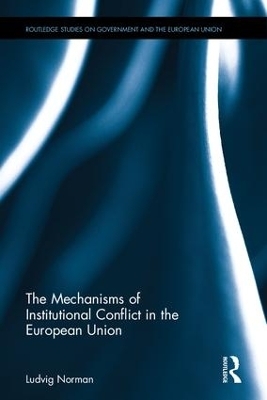
The Mechanisms of Institutional Conflict in the European Union
Seiten
2016
Routledge (Verlag)
978-1-138-96309-2 (ISBN)
Routledge (Verlag)
978-1-138-96309-2 (ISBN)
How institutional conflicts arise in international political orders and the conditions shaping the outcomes of such conflicts has become the object of considerable contemporary focus.
This book considers the dynamics of institutional conflict and institutional change in international organizations, specifically focusing on the European Union, the most highly integrated international political order on the globe. In a world where political decision making increasingly takes place above the nation state level, it theorises the social mechanisms that lead to the point at which these tensions become explicit and the customary functioning of international political orders tips into outright conflict between different organizational entities. Taking a constructivist approach, it examines two in-depth case studies - in the field of Justice and Home Affairs (JHA) and the EU’s Common Foreign and Security Policy (CFSP) - to explain the dynamics of the processes that lead up to institutional conflicts and provide some explanation for their final outcomes.
This text will be of key interest to fields of and European Integration, EU Politics and more broadly International Relations.
This book considers the dynamics of institutional conflict and institutional change in international organizations, specifically focusing on the European Union, the most highly integrated international political order on the globe. In a world where political decision making increasingly takes place above the nation state level, it theorises the social mechanisms that lead to the point at which these tensions become explicit and the customary functioning of international political orders tips into outright conflict between different organizational entities. Taking a constructivist approach, it examines two in-depth case studies - in the field of Justice and Home Affairs (JHA) and the EU’s Common Foreign and Security Policy (CFSP) - to explain the dynamics of the processes that lead up to institutional conflicts and provide some explanation for their final outcomes.
This text will be of key interest to fields of and European Integration, EU Politics and more broadly International Relations.
Ludvig Norman is Senior Lecturer in the Department of Government, Uppsala University, Sweden.
1. Dynamics of Institutional Conflict in the European Union
2. Institutional Conflict and Change in International Political Orders
3. Explaining Institutional Change: The Role of Interpretive Process Tracing
4. Institutional Conflict in EU Criminal Law
5. Institutional Conflict in the EU’s External Action
6. Explaining institutional conflict: the Rupture Mechanism
7. The Environmental Crimes Case
8. The Small Arms Case
9. Conflict Dynamics: The Discursive Lock-in Mechanism
10. Concluding Remarks
| Erscheinungsdatum | 25.05.2016 |
|---|---|
| Reihe/Serie | Routledge Studies on Government and the European Union |
| Zusatzinfo | 2 Tables, black and white; 7 Line drawings, black and white; 7 Illustrations, black and white |
| Verlagsort | London |
| Sprache | englisch |
| Maße | 156 x 234 mm |
| Gewicht | 408 g |
| Themenwelt | Sozialwissenschaften ► Politik / Verwaltung ► Europäische / Internationale Politik |
| Sozialwissenschaften ► Politik / Verwaltung ► Politische Theorie | |
| ISBN-10 | 1-138-96309-7 / 1138963097 |
| ISBN-13 | 978-1-138-96309-2 / 9781138963092 |
| Zustand | Neuware |
| Haben Sie eine Frage zum Produkt? |
Mehr entdecken
aus dem Bereich
aus dem Bereich
Studienbuch
Buch | Hardcover (2023)
De Gruyter Oldenbourg (Verlag)
44,95 €
erfolgreiche Interessenvertretung durch Prozesskompetenz im komplexen …
Buch | Hardcover (2023)
Wiley-VCH (Verlag)
42,00 €


